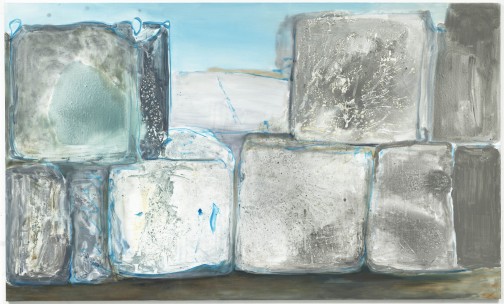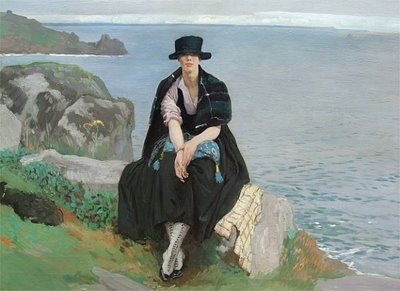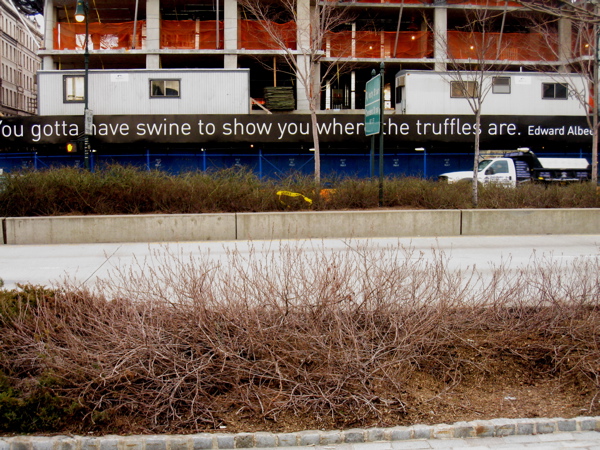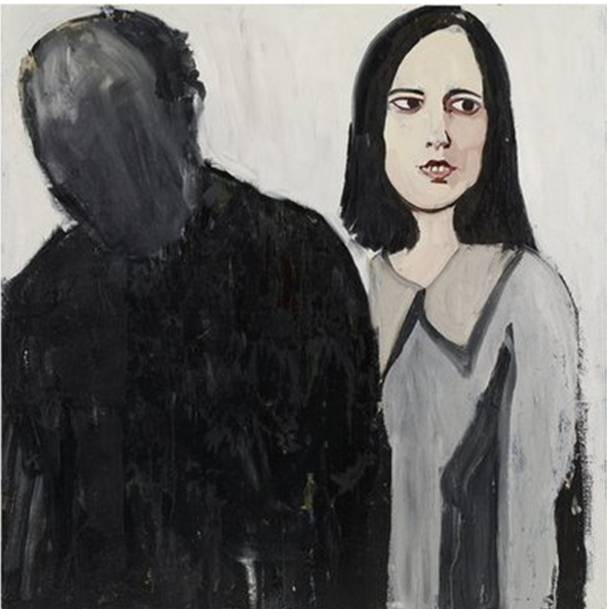 THE WORLD
THE WORLD In Which We Are The Picture Of Mental Health
 Thursday, September 22, 2011 at 11:14AM
Thursday, September 22, 2011 at 11:14AM 
The Rabbit Hole
by KARINA WOLF
On Wednesday, Julia says she doesn’t want us to read for an entire week. No, she amends, not just no reading, also no talk radio, no music with lyrics, no television, no e-mail, no web browsing, and no chatty phone calls that we wouldn’t ordinarily make. "I'm not going to tell anyone not to see a movie," she hedges. "But there may be other things you can do with your time."
The Artist’s Way is the perfect workshop for an aspiring Left Coast-ist. There are affirmations, visualizations, and the idealization of synchronicitous events. The author of the book and workshop, Julia Cameron, also talks about her ex-husband, Martin Scorsese (Sicilian Scorpio) and about herself (sensitive Pisces). She’s writing a musical and, sometimes, there is group singing, which she insists puts us in touch with our better nature. It’s a strange group, between 50 and 70 students, a salad of Westchester moms, brides-to-be, guys with broken hearts and broken limbs, students who are doing NIA dancing, whatever that is, and a photographer who’s following the Diamond Approach. A latently angry lot. This is group therapy for artists, creative recovery according to Julia.
I’m open-minded about personal betterment strategies. I’ve been subjected to a lot of them, thanks to all the therapists in the family. I’m also starting to think that, like my dogs and my niece, I’d have a greater sense of security from a better set of rules. But as a freelancer who works from home, I know this will be an interesting experiment in madness.

On the way out, I check for texts, e-mails, and Facebook updates, call my dad and walk to Magnolia to buy a fortifying dose of sugar. I suspect that the instrumental Arvö Part on my laptop will only heighten this Bergmanesque austerity, so I stuff my iTunes with Charlie Parker and Miles Davis (no duets with Ella, though: no lyrics!). I am now hopped up on green tea latte and chocolate cupcake. There is nothing to do but spy on the naked neighbors, clean the refrigerator and listen to “In a Sentimental Mood” 45 times.
Before I fired my acupuncturist, Dr. Y determined (through muscle testing) that all my problems stemmed from “the concept of living through others”. I want to congratulate him—the entirety of my thoughts and memories seem to come from media, ether- and other-generated materials. I linger nostalgically over my most recent media forays: that puzzling YouTube clip about John “Walnuts” McCain; the wiki entry about Charlie Parker’s recording of "Lover Man"; those Asobi Seksu songs.
Certain half-measures occur. Can I, for example, flip through the Maira & Tibor Kalman book of photos that I just bought? No words there. But I’m bargaining. It would be a little like when I went to the fascist nutritionist who nixed sugar, dairy, wheat, starches, fruit, caffeine, and alcohol from my diet. Sometimes the desire for bread became so intense that I’d have to unfasten a bag of sourdough just to sniff at the contents. If I’m still craving it, I’m probably not cured.
On Thursday, I’m perfect — most of the day. It’s raining so I can’t get Hector to install the pigeon wires. There is nothing to do but walk the pups and write.
I had already made plans to see Gemma Hayes and Mundy at Mercury Lounge, and I decide to soak up every locution and lyric that comes my way. Nourishment for my inner artist. Gemma Hayes has West Coast malaise: she was shopping for a bikini in LA and discovered the one she liked was dry clean only. Get it? Her remarks are a little evolved for the crowd, a rowdy Saint Patrick’s day warm up. But she is gracious when someone’s mobile phone interferes with the sound, and her song “Back of My Hand” echoes pleasantly in my word-parched brain.
Gemma admits that kids are cruel. When she was 9 or 10, there was a little boy in her class who kissed her while the teacher was writing on the blackboard. All the other students jeered. Gemma waited after school, beat the crap out of him, and threw the boy and all his copybooks into a puddle. A few days later, the boy came over to her, apologized and gave her a present. "So treat ’em mean, I guess," she says, after apologizing to the memory of the humiliated schoolboy.
Mundy is a little rough around the edges. "Someone up here farted?" He waves his hands around. “It’s a fart with wings, then. Or someone has a very high ass.” He plays a couple of songs. I even get a shout out before his single from the Romeo + Juliet soundtrack. There are a couple of wolf whistles, though my name means, obviously, nothing and Mundy also dedicates the song to some stewardesses, buxom blondes, and bartenders who are following him around.
Afterward, we find ourselves at the Scratcher, where Paddy Casey is sitting at the bar like a gnome on a toadstool. Mundy comes along, then the cabin crew from his Aer Lingus flight, then the guy from The Frames who won the Oscar.
At the bar, we talk to a transplanted record producer, Shuggie, whose eyes are springing from his head—think Susan Sarandon with hyperthyroidism. Can you guess where my name comes from, he challenges us. The most famous Shuggie of them all. Can you guess. Guess.
I take a stab. Shuggie Otis?
No. He’s crestfallen. Sugar Ray Leonard.
I met Mundy in Monaghan. Recalling this, he pulls out the book he’s reading — Patrick Kavanagh, he believes, is going to inspire the final song for his new album. I’m three paragraphs into the Monaghan poet’s The Green Fool before I realize I’m having Word Rush. I feel exhilarated and slightly queasy, the sensation you’d have shopping at the Columbus Circle Whole Foods after exiting a sensory-deprivation tank.
I hand back the book and start talking to Paddy, who is a cross between Vladimir Putin, Crispin Glover and Lyle Lovett. Discretion of Putin, stare of Crispin, frizzy hair of Lyle. He also has the tiniest, most recalcitrant mouth I’ve ever seen. His cure for writer’s block, he tells Mundy, is to unplug everything in the house and lie in the dark until something happens. Seems to work; he’s being followed around by MTV for a documentary about his new album.
We notice that Paddy is wearing seven layers of zip-up jackets. He is his own nesting babushka/tootsie roll pop. We set about unlayering Paddy Casey. He is resistant. He leaves at four because he has to make an in-store appearance at ten in the morning. How are you going to wake up, we ask him. I don’t have to wake up. He smirks. Someone will do that for me. This reinforces my thought that everyone needs personal support staff.
I have a hangover for four days.

The following afternoon, I meet another friend-from-abroad and we walk down past Battery Park to the piers. Spalding Gray departed on his final ferry ride here and this is the site of the catalytic events of Desperately Seeking Susan, when Rosanna Arquette loses her memory. It is pissing rain but my friend has never seen the Statue of Liberty and we decide to take the trip anyway. Why not? A chance to rewrite history. The last time I was in Staten Island, I had gotten trapped at a party in New Dorp and a 50 year old roadie was trying to read my palm (I was 17).
On the way over, it is grey and foggy and the windows are so steamed up it is impossible to see anything. We get out of the station, head for a bar and decide to exchange music. I’m violating the word-rules again but I reason that this is more of a melodic dialogue — my friend wants to play something new he’s written.
A big, balding, grey-complected guy is writing out bills at the bar. Hey, he yells. Take the earphones out and talk to each other. He keeps harassing until we turn off the iPods and chat to him. Not talking is gonna break you guys up. I’m assuming you’re a couple.
We were, says my friend. We broke up an hour ago but we’re thinking of getting back together.
Sometimes people break up in order to make up. It’s the making up, if you know what I mean. Harold — or Harry, or Hal — starts singing Al Green songs. He’s a widower (last May) but feels that he’s ready to move on. He also tells us that he lived in Bournemouth for 6 months, and the highlight of that time was his participation in Grab a Granny parties, the very Brit-perv tradition of going off for a night with an elderly woman. Hal went home with a 70 year old when he was 35, he tells us, and it was the best sex of his life. We cover our ears.
We return in heavy rain to line up for the departing boat. There is a giant aquarium in the waiting area. We look at the fishes. One of them looks like a parrot (it has blue, beaky lips), one is a stick of chewing gum, the silver ones resemble Lamborghinis, one strangely shaped guy with bulging eyes is kind of "slow." On the return, the ferry passes the Statue of Liberty, and we imagine having the lone night watchman job.
We had a week-long fling a while ago, me and this friend; we always have a good time but I’m suddenly certain that Julia would say the right thing is always to keep moving forward.
The next day, my father, Dr. W, stops by after the panel on erotic transference. He's glowing. He liked all the speakers, he tells me, even the elderly Jungian, who was happily married and only realized her feelings of eros toward a patient after having a dream in which a Bengal tiger was riding shotgun in her car. I think you would have found it enormously helpful, my father tells me. Sometimes he forgets that I am not a work colleague. Or maybe it’s wishful thinking. He has brought mail, including books I had ordered from Amazon. I’m not tempted, even though I had so much coffee at lunch that I lie in bed all night, thinking. Barry has started to snore. I wonder if he has a deviated septum, sleep apnea, food allergies.

On Sunday, I am forced to read. In these cases, Julia advises, we should keep a media log. I head up to my teaching job, spend the morning with the Koreans and write down: 7 vocabulary questions, one dual passage on Gone with the Wind and Sherlock Holmes, one long passage on wolf behavior, one New Yorker article on Michelle Obama.
I’m stoic on the return subway. I can’t listen to any more ambient music. I will just look at people, the way Maira Kalman does. I get home, can’t sleep, eat quantities of sugar, tear open the box from Amazon and sink into 90 pages of Susan Shapiro’s addiction memoir, in which she chronicles giving up smoking, toking, drinking, eating bread and chewing gum. I don’t even feel guilty, I’m enjoying it so much. I force myself to stop and do my own writing. I stop my own writing and finish the entire book.
Julia would call this a binge. Shapiro would say I’m "self-soothing" by practicing my word habit. Learn to get comfortable with suffering, her shrink Dr. Winters asserts.
I have been trying all week to think up things to tell George, my new therapist, and have been keeping a list of dreams. Luckily, the caffeine intake has produced some restless nights. I am able to recall that the character from V for Vendetta pursued me in the most recent one. George hasn’t seen Vendetta so he asks me to free-associate on the Hugo Weaving character. He’s wearing a Guy Fawkes mask, I muse. When I say that I associate Guy Fawkes with resistance instead of rebellion, George finds it very interesting.
He’s also skeptical about the word assignment. I consider aloud whether conversation and alcohol are in violation of the no-media rule.
“Words are supposedly allowing me to avoid feeling and now maybe I’m substituting conversation for feeling.” George thinks I think too much, and reminds me that it is healing to interact with other human beings. "I think it’s okay if you skip the logos fast," he advises. In celebration, I go home and listen to podcasts with the Coen brothers and the screenwriter Ronald Harwood. Harwood is out of this world.

Then I receive an alarming e-mail from my sister-in-law. I can’t help but read it.
I can't believe you are taking an actual class with the woman who wrote the Artist's Way! I can't believe it! I can almost remember her name, is it Julia Cameron? I didn't realize she had been married to Martin Scorsese. How many times has he been married, anyway? I know about 20 years ago he was married to a woman who had his baby at like age 55, but since it wasn't all over the news, I am guessing she used someone else's eggs and they hush hushed it. I remember thinking that was very intriguing at the time, and wondering why I couldn't read all about it in People magazine. Was that the same woman?
I faithfully followed her book during a period when I was feeling incredibly uncreative, and I really adhered to the whole protocol down to the last detail. I certainly DO remember how tough it was not to read anything for that time, I remember forcing myself not to cheat and read the cereal box at breakfast.
Busted. My sister-in-law goes on to tell me that she was able to earn a living entirely from her own artwork after following the protocol in this book. I have to reconsider George’s words.
Elizabeth Hardwick’s book Seduction and Betrayal lies abandoned by the nightstand. In it, she writes about my favorite novel, Wuthering Heights. WH is not a deconstruction of social constructs like Charlotte’s Jane Eyre. (Was it Charlotte who wrote Jane Eyre? Without the internet, I’m creating an entire literary history, like that woman who wrote a world history entirely from her own spotty memory; or Maira Kalman’s mother, who drew a subjective map of the United States when compromised by dementia). The novel’s interest is in following a perpetuating psychic trap. And by this point, I know: I am caught in my own psychic trap.
I survive until Wednesday. Before class, I run down and take a picture of the billboard I keep thinking about whenever I walk by the river. Albee is always trenchant:

The best part of Wednesday night is when Julia reads out our cards about how we’ve completed the weekly assignments.
We get to hear what each person has done for his artist date (an activity, carried out alone, that’s fun or stimulating artistically). Someone went to see Richard Diebenkorn; someone saw Dianne Wiest in The Cherry Orchard; someone had a threesome. “I know it involves two other people, but my artist self was very happy.” Another student: “I wrote a love letter to a woman whom I’ve recently fallen in love with. I’m a woman with a boyfriend. It’s your fault, Cameron.” Guffaws and clapping.
Then we talk about how people experienced the reading ban. Some people found that words were a barrier between themselves and their own perceptions. Some discovered that no media meant they stopped living vicariously. Some people drew better boundaries. One student asks Julia how often she uses these kinds of strategies in her own life. “As needed,” Julia says. “I do it when the class does it. And then sometimes spontaneously. Probably a lot of you know that I had a nervous breakdown last year.”
Clearly, not everyone knows she had a nervous breakdown last year.
A guy who has told me he’s depressed raises his hand and asks, “So what were the causes of your breakdown? Were they mostly external things?” I know that he’s asking because of his own difficulties, but it feels like an invasive question in front of a huge group.
Julia answers pretty honestly. A combination of external things, the wrong meds, a family history of depression — this hasn’t been the first time. She is so gracious and poised. Everyone is quiet. "I was fine on Tuesday — I was teaching this class — then all of a sudden, I couldn’t form sentences. My mind was fragmented. And it was interesting, because a lot of the recuperative therapy involved exercises like the ones in creativity class." Suddenly, everyone laughs and any resistance evaporates.
Karina Wolf is the senior contributor to This Recording. She is a writer living in Manhattan. She twitters here and tumbls here. You can find an archive of her writing on This Recording here.

"All These Strangers" - Elvis Costello (mp3)
"The Spell That You Cast" - Elvis Costello (mp3)
"That's Not The Part of Him You're Leaving" - Elvis Costello (mp3)

 chantal joffe,
chantal joffe,  julia cameron,
julia cameron,  karina wolf
karina wolf 




























